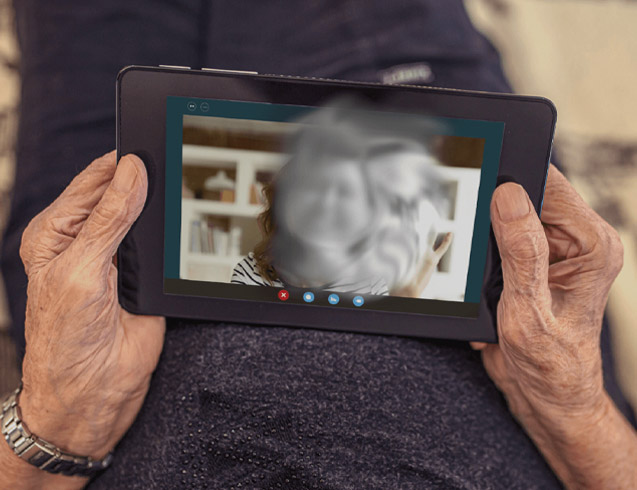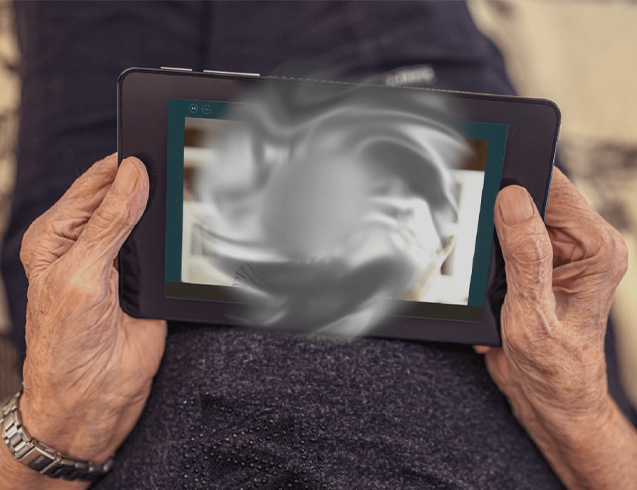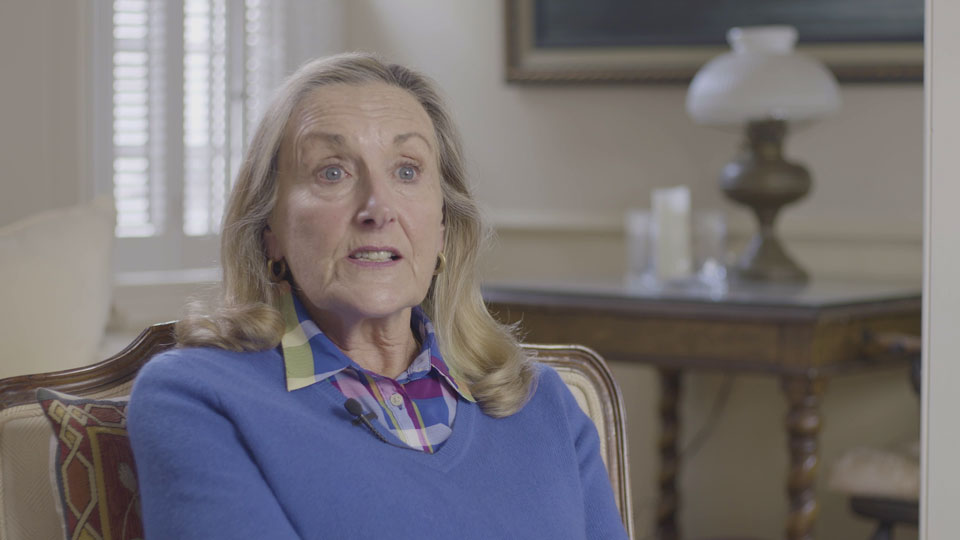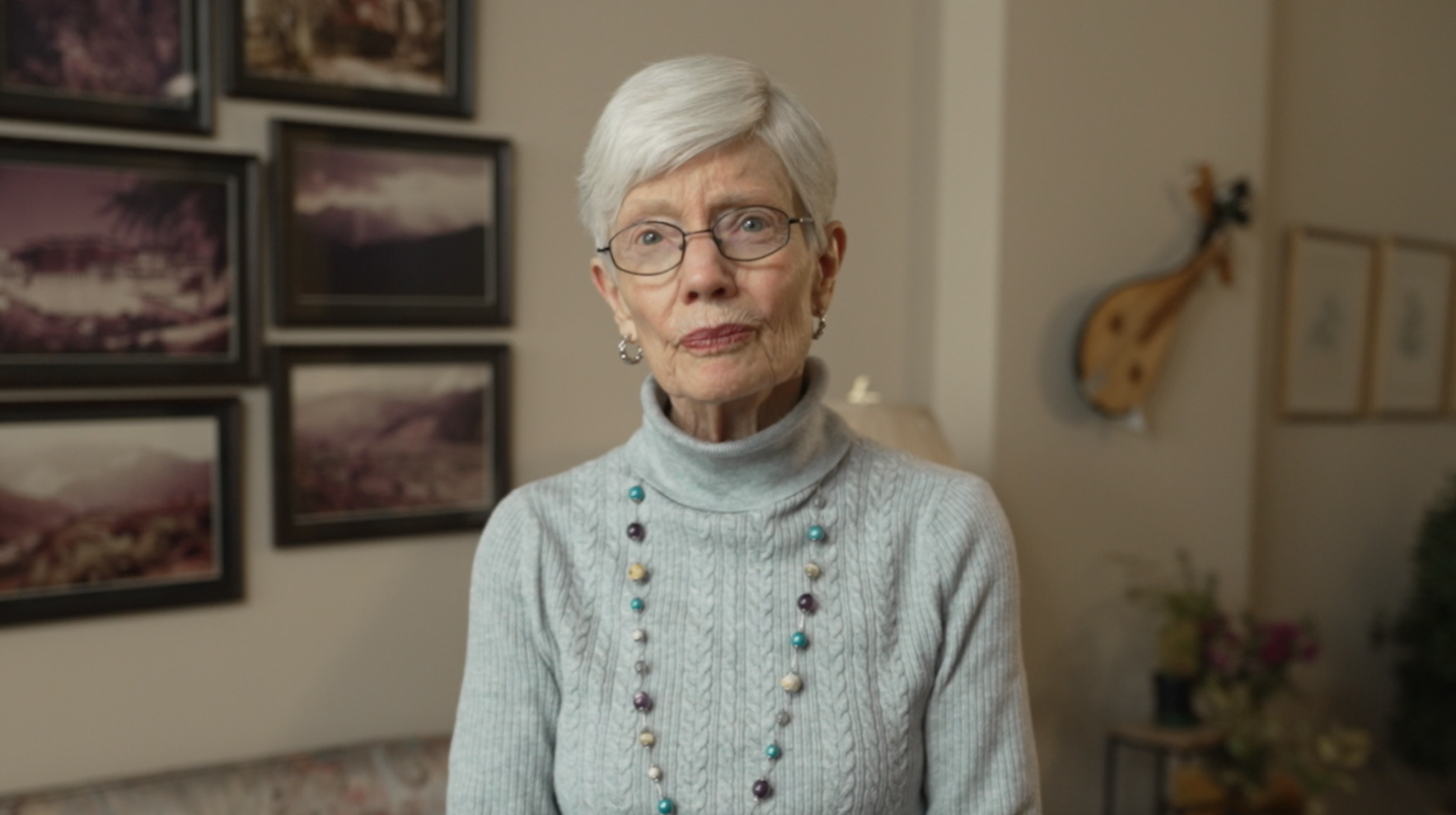GA can have a devastating impact on patients’ lives1,2
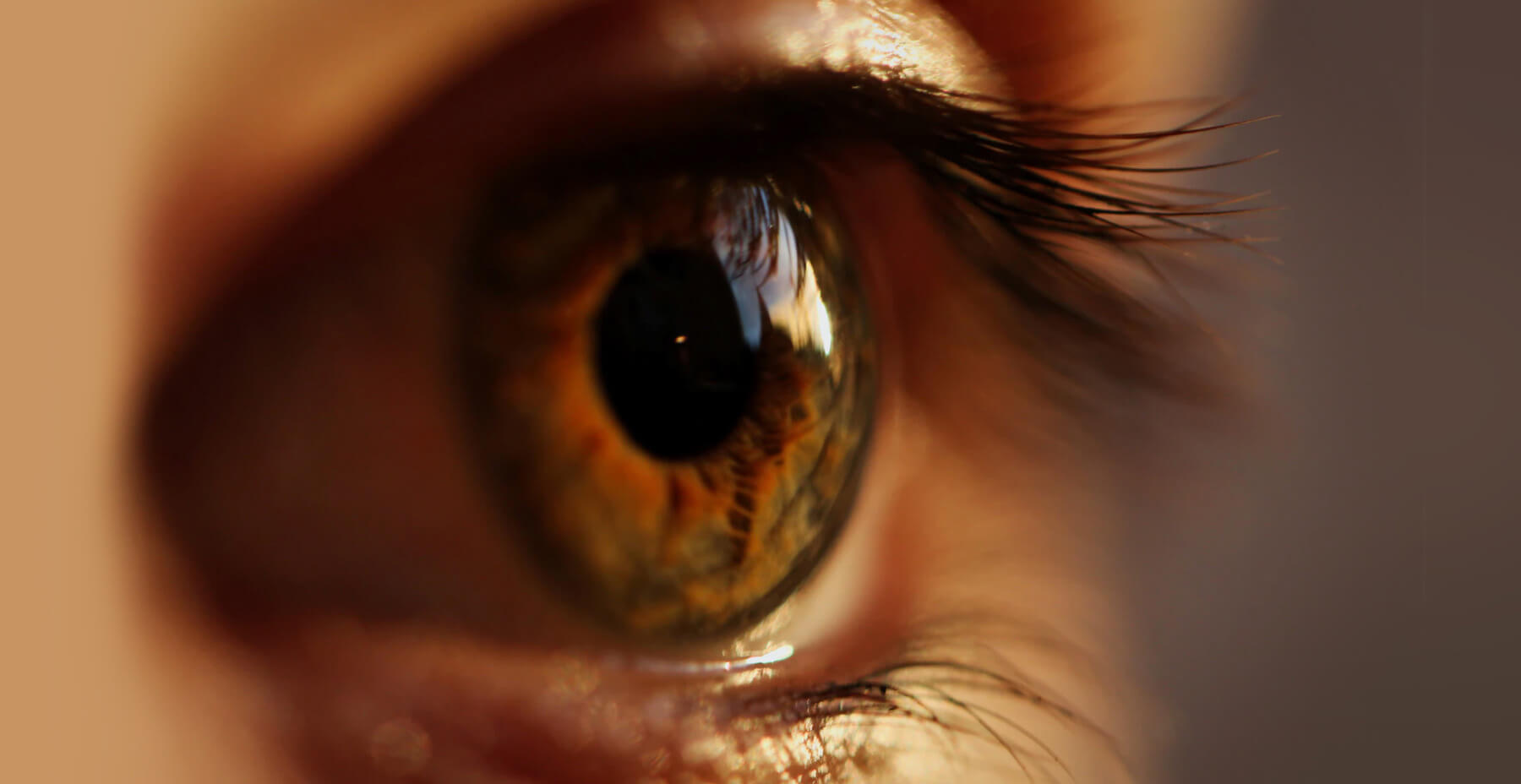
Vision-related quality of life (QoL) worsens with disease progression2
GA places a significant burden on patients and those who care for them. Visual decline impacts patients’ ability to perform essential and enjoyable daily activities.1,2
In two small cross-sectional qualitative studies*†, interviews with patients with GA and their caregivers revealed that vision loss has affected:
A patient’s quality of life living with GA
Vision loss from GA can lead to reduced QoL, including several aspects of mobility and independence.1-3
In a retrospective cohort analysis (n=523) of patients with bilateral GA in the UK4‡:

patients
In a small qualitative US study of patients with GA (n=8) and their caregivers (n=6)1*:

of patients living with GA reported having difficulty reading for every tasks or for leisure

of caregivers reported that patients had difficulty with daily tasks
*A cross-sectional qualitative study of patients with symptomatic GA, their caregivers, and eye care professionals who treat patients with GA (N=19) who were interviewed at US sites to evaluate understanding of the disease, costs and burden of illness, use of vision aids or services, and impact on emotional or psychological well-being and on daily activities.
†A cross-sectional ethnographic study (N=16) conducted to understand the impact of bilateral GA secondary to AMD on daily functioning by observing regular activities performed at home and through semi-structured interviews.
‡A retrospective cohort analysis (N=1901) of a multicentre electronic medical record database examining disease burden and progression in patients in the United Kingdom with bilateral GA secondary to AMD. Loss of driving was assessed among patients with visual acuity (VA) follow-up and who were eligible to drive at baseline (n=523).
AMD=age-related macular degeneration; GA=geographic atrophy; QoL=quality of life; UK=United Kingdom.
See through the eyes of a patient with GA
Use the slider to experience the progression of GA over time.
Joan, age 70 at diagnosis
For illustrative purposes only.
GA stories
Watch real patients talk about their personal experiences with GA.
Santi was compensated for her participation in this video.
The following video was developed by Apellis Pharmaceuticals, and the patient was compensated by Apellis to share her story. It contains the views, opinions, and experience of Santi, a person living with Geographic Atrophy (GA). The video does not include individual treatment or medical advice. You should consult your doctor for medical advice or about any questions and concerns you have about living with GA.
Geographic Atrophy (GA) is an advanced form of Age-Related Macular Degeneration (AMD). GA is a leading cause of blindness that affects 5 million people worldwide.
VO: For me, even as a little girl, I was so visual – and I would just thank God just for everything I could see. I’m so amazed at things that are beautiful, and did I know that somewhere down the road I was going to get this diagnosis? I don’t know.
I have Geographic Atrophy in both eyes. Getting this diagnosis terrified me. I was afraid to go to sleep. I didn’t want to wake up and have lost the world. And I think we all get challenges in life, this was mine.
And when the Geographic Atrophy hit, it went down fast. And then things started to disappear, like a phone pole would be crooked and there’d be parts of that pole that I wouldn’t see. And then I was legally blind. I’ve always been very independent and very visual. To think of missing that bird that’s at the feeder or the bunny that crosses the street. If I couldn’t walk my dog.
Going down stairs is very scary because of the depth perception. I fell down my stairs here very badly. I immediately tried to minimize it, but I couldn’t get up. I was really hurting. I thought, “there’s going to be a day when I’m not going to be able to drive.” I sold my house. I moved where I could walk everywhere. You know, all these things to try to troubleshoot, but the hard part was the emotional part.
I have to feel useful. I started to go to this orphanage and just working with the kids, talking to them, I started to feel such a sense of peace. I was always the helper. I was always the one taking care of people. I have to find that middle road of being able to ask for help with grace and appreciation.
I hope that it doesn’t come to the point where I don’t see it. You know, I don’t want to miss one sunrise. In every challenge I’ve ever had, there’s always been a gift that hasn’t been apparent right away. But if there always has been, I’m assuming there always will be.
Liz was compensated for her participation in this video.
The following video was developed by Apellis, and the patient was compensated to share her story. It contains the views, opinions, and experiences of Liz, a person living with Geographic Atrophy (GA). The video does not include individual treatment or medical advice. You should consult your doctor with any questions or concerns you have about living with GA.
VO: When I think about it, I would have to say that virtually every aspect of my life has changed. It’s not just that you’ve lost a physical ability. You also really have to try to hang on to your sense of who you are. My name is Liz Tully, and I’m in my early 80s.
It’s really hard for me to say when I first started noticing symptoms of GA. But they were things like when I was reading, all of a sudden, an odd letter, or word, or sometimes even a whole sentence would suddenly jump up and appear in the line before the line I was actually reading. Or when I was driving, especially at night if it had been raining, and the streets were wet. I couldn’t see very well, and I felt very uncomfortable. And then, after a few years I suddenly started to notice that when I went from a lighter area into a darker one, I couldn’t see where I was. Until I let my eyes adjust.
So, the really important thing I want to say to anybody who is experiencing symptoms like this, and like I, at the time, thought they were just eye fatigue… don’t assume anything. Only an eye doctor can tell you whether or not you are developing GA. My left eye now registers 20/200 on the eye test my doctor gives me. Which is legally blind in Canada. But my other eye is still, I’m very lucky, it’s gone from 20/40 to 20/60. Which is considered low vision.
One of the things I’ve noticed as my GA has progressed, is that how I do things has to constantly change. One of the things you know you have to be aware of when you develop something like vision loss, is you really feel like you’re losing your sense of identity, who you are. And it’s so important to hang onto as much of that as possible. And for me, that means wearing a bit of jewelry. I’m rubbish with scarves, but a bit of jewelry is really nice. But I have to be able to find it. So, I’ve dreamt up getting a series of bowls of different sizes. And each bowl has its own specific contents. So, I can feel what’s in there.
Everybody reacts differently to the news that they have GA. Because it is devastating news to be told that you’re losing your sight. You really have to come to grips with it. Because if you don’t, you can’t move on. And to do that, I needed to grieve. I really needed to acknowledge what was happening, and what I was losing. But then I needed to remember what I still had. I know I’m going to continue to have good days and bad days. That just goes with the territory. But I know that if I really enjoy the good days, and I try to do that, I’m going to be able to weather the bad days.
Understanding complement
Discover how excessive complement activation may increase the risk of GA lesion growth.

Connect with us
Sign up for updates and information from Apellis.

References:
- Singh RP, Patel SS, Nielsen JS, et al. Patient-, caregiver-, and eye care professional-reported burden of geographic atrophy secondary to age-related macular degeneration. Am J Ophthalmic Clin Trials. 2019;2(1):1-6.
- Sivaprasad S, Tschosik EA, Guymer RH, et al. Living with geographic atrophy: an ethnographic study. Ophthalmol Ther. 2019;8:115-124.
- Patel PJ, Ziemssen F, Ng E, et al. Burden of Illness in Geographic Atrophy: A Study of Vision-Related Quality of Life and Health Care Resource Use. Clin Ophthalmol. 2020;14:15-28.
- Chakravarthy U, Bailey CC, Johnston RL, et al. Characterizing disease burden and progression of geographic atrophy secondary to age-related macular degeneration. Ophthalmology 2018;125:842-849.







